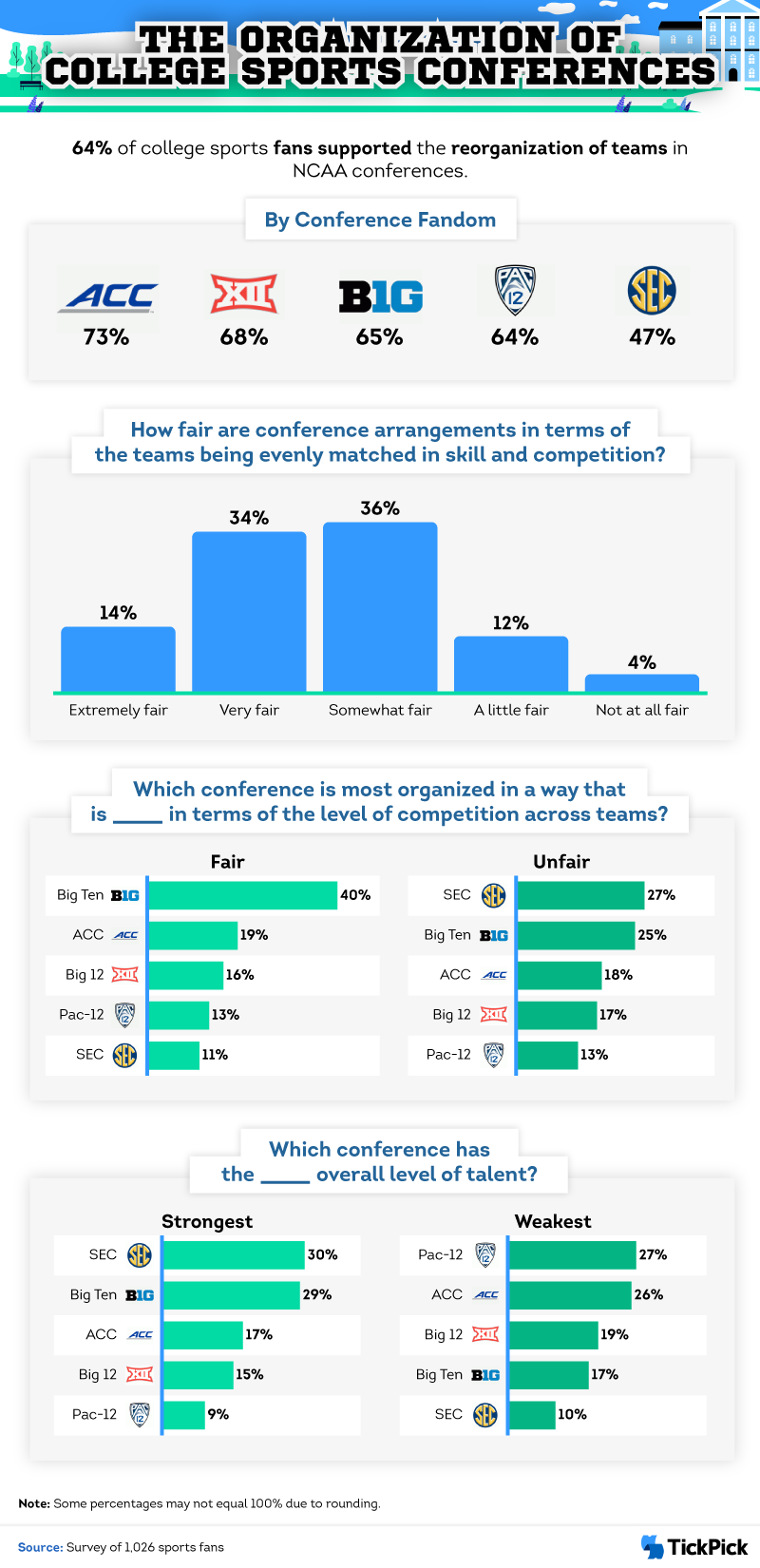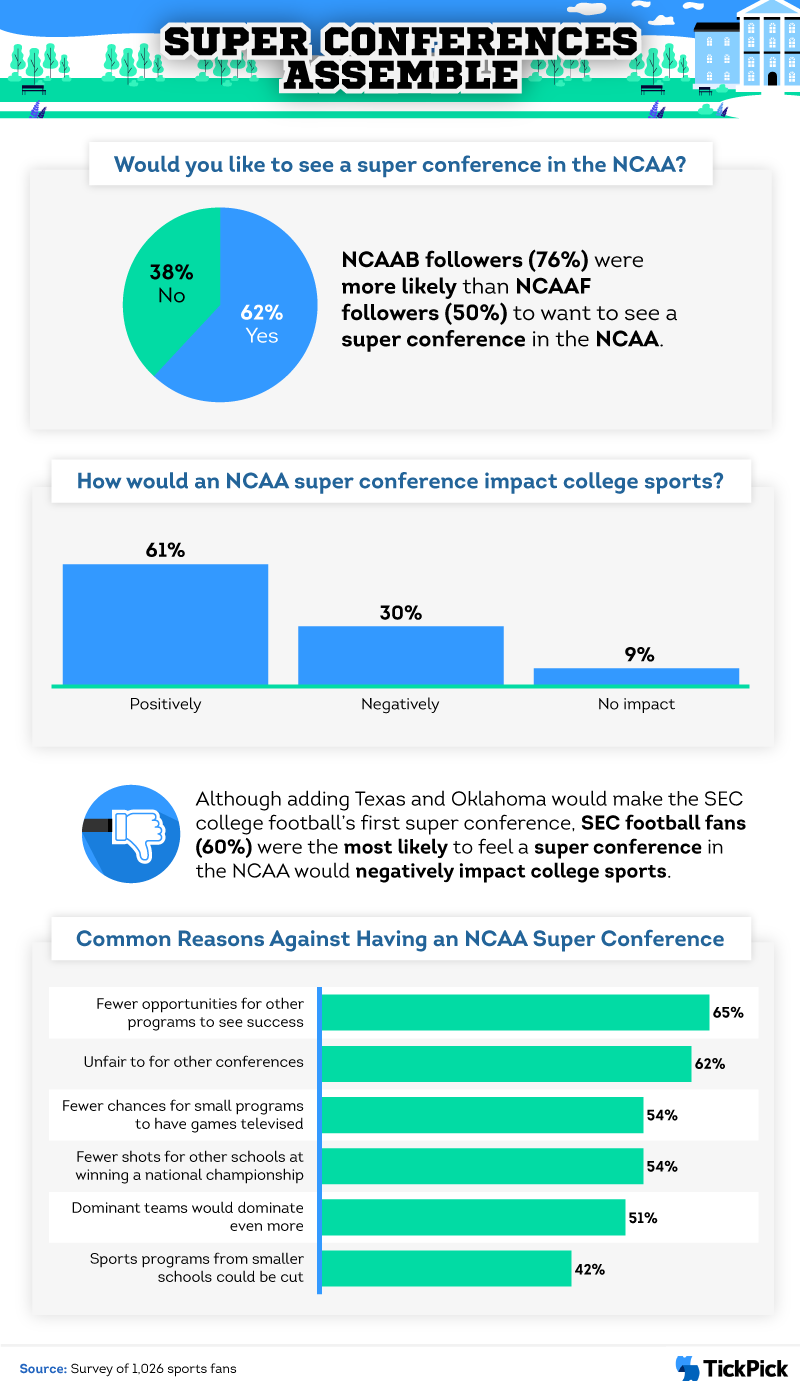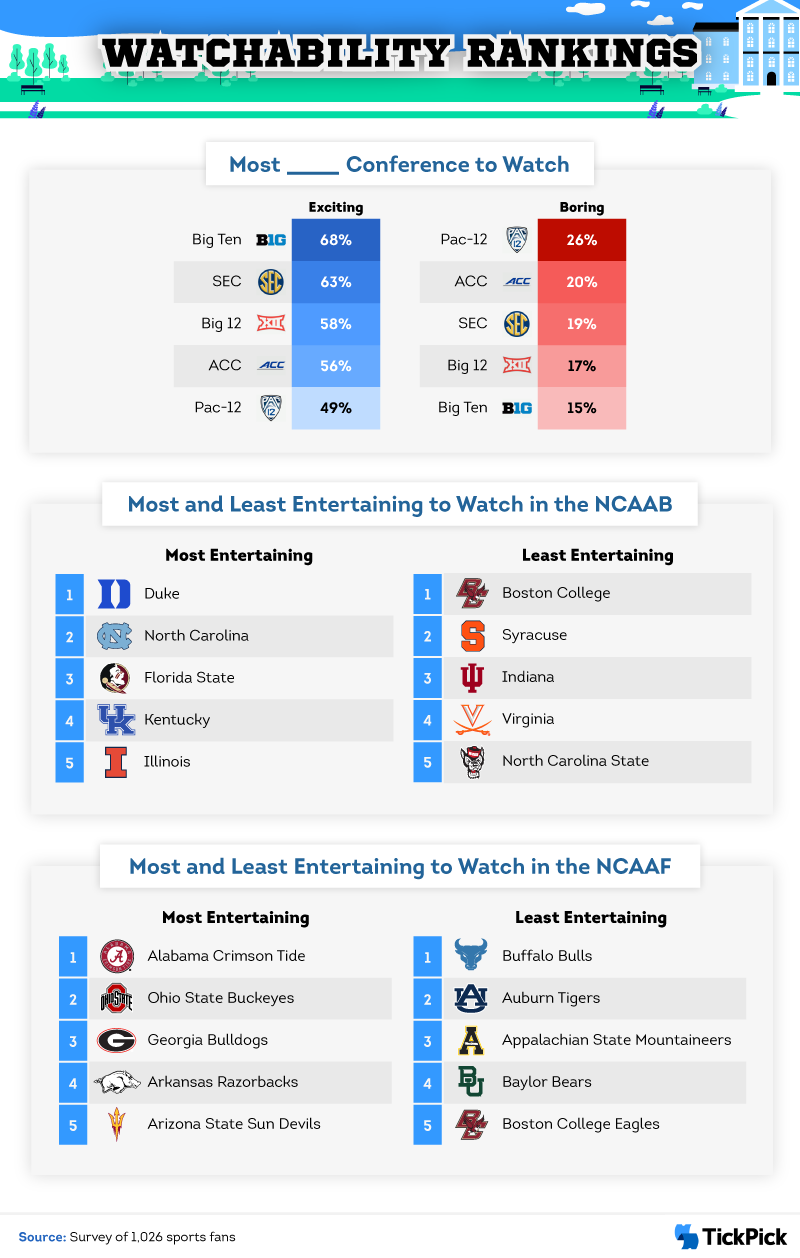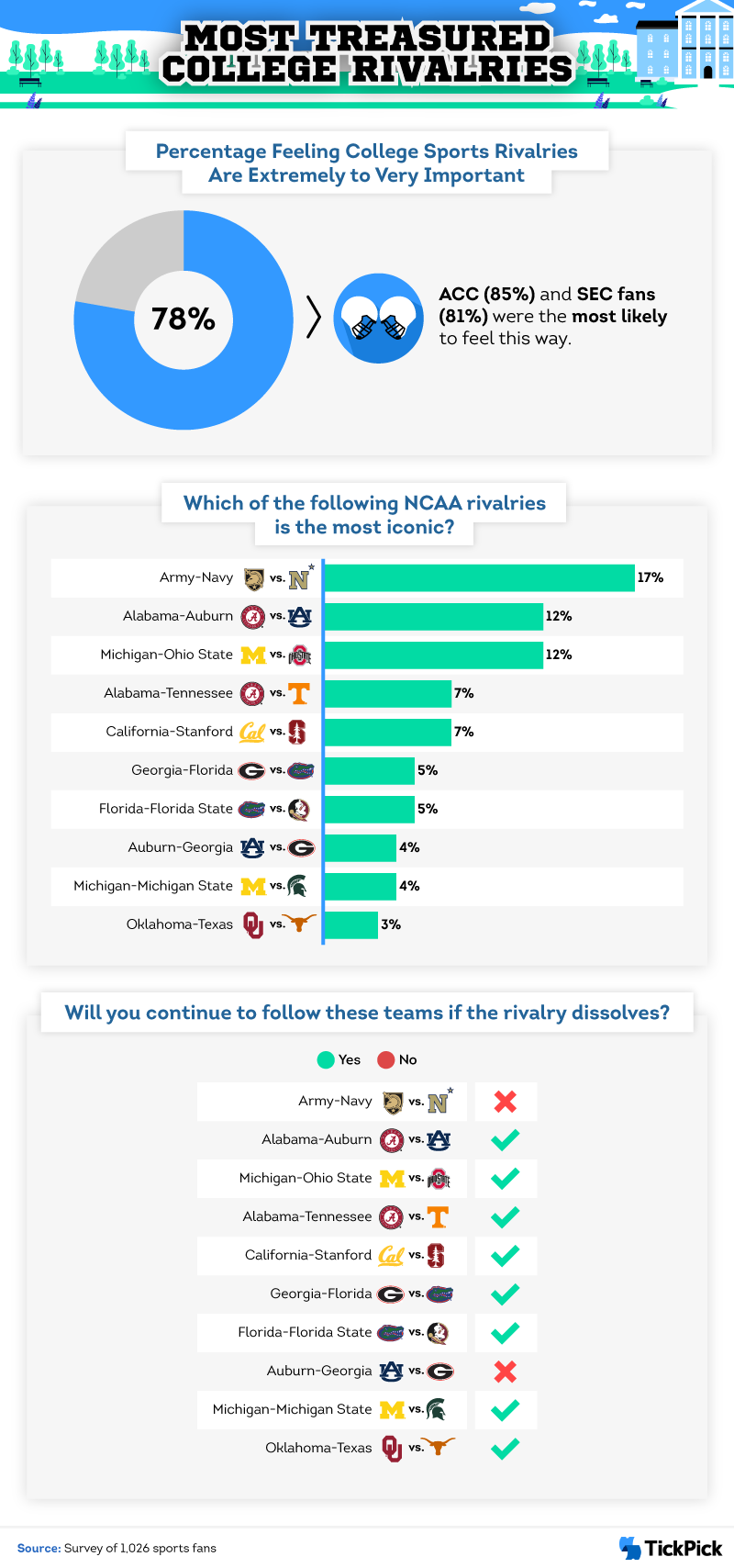64% of college sports fans supported the reorganization of teams in NCAA conferences.
More than 1 in 4 believed the Pac-12 was the weakest conference.
27% of college sports fans felt the SEC is unfairly organized in terms of level of competition across teams.
According to college sports fans, Army-Navy is the most iconic NCAA rivalry.
Each year, thousands of college football and basketball fans eagerly anticipate iconic rivalry games. When it comes to college football, most of the heated cross-state rivalries occur around Thanksgiving, give or take a weekend.
Imagine the trash talk between Alabama and Auburn fans after the 2021 Iron Bowl game or friends and families divided between Penn State and Michigan State!
With the Southeastern Conference (SEC) adding two teams, the realignment of other NCAA Division 1-A conferences seems inevitable. The concept of fewer conferences with larger rosters, referred to as "super conferences," appeals to some. Yet, other sports fans are skeptical of their success. An overriding issue is "fairness."
Follow along as we unpack the thoughts of college sports fans and how future traditions may change.
How do fans view larger conferences? Will changing conference sizes make games more or less fair? That depends.
Almost two-thirds of respondents who are college sports fans indicated their support for conference realignment. Assuming that occurs, a few long-standing rivalry games could end, but a few might resume, too. When broken down between the NCAA's largest revenue sports, 59% of football fans support conference realignments, compared to 71% of basketball diehards.

Fans who have watched their conference teams struggle to compete on the national stage were more likely to favor conference realignment than conferences with winning traditions. Here's an example:
Since 2000, SEC teams have won or shared 12 college football championships. The Atlantic Coast Conference (ACC) captured four. The Big Ten and Pac-12 won twice, with the Big 12 claiming a lone championship trophy.
If we go back between 1980 and 1999, the winning programs look much different. The ACC won or shared eight championships, the Big Ten five, the SEC four, and independent schools two. Pac-12 and Big 12 teams each won a single football championship.
There's no question that the SEC is dominating college football—with no signs of slowing down, since there's a high probability that two SEC teams will make the 2021 playoffs.
If we examine NCAA basketball champions during the same periods, the results are much more diverse. Keep in mind that there are more NCAA 1-A basketball conferences, and a few teams play football in one conference and basketball in another.
ACC hardwood programs lead the pack with nine championships between 2000–2021. From there, the numbers shrink. The SEC and independent teams claimed three trophies, the Big 12 two, the Big Ten one, followed by the Pac-12 with no hardware for their trophy case. Less relevant conferences crowned other champions. (Note: No champion was crowned in 2020 because of pandemic shutdowns.)
The lopsided numbers above may contribute to why fans from certain conferences support realignment more than others. Among those in favor, the percentages were as follows:
For college sports fans, size does matter. Almost half of the respondents believed conferences should add more teams. However, about one-quarter felt conferences should contain fewer teams.

When raising the subject of "fairness," fans had strong opinions. The SEC was singled out as the conference with the highest "unfair" rating at 27%, followed closely by the Big Ten. Interestingly, other fans also labeled the Big Ten as the fairest.
The SEC and Big 10 stood head and shoulders above other major conferences in terms of which conference has the strongest overall talent. Fans felt that the Pac-12 and the ACC put forth the weakest talent.
The midsummer 2021 announcement that Oklahoma and Texas are bouncing from the Big 12 to the SEC rejuvenated the conversation of super conferences, meaning fewer conferences with more teams.

It's important to note that while basketball and football programs at most major colleges compete in the same conference, other gridiron and hardwood teams split by sport. That may explain why 76% of basketball fans and 50% of football fans supported super conferences, 61% of combined fans expected a positive impact.
Even though the SEC will give birth to the first sports super conference, 6 out of 10 football fans felt the growth of these mega conferences will hurt college athletics. Then again, why would the conference producing multiple championships from men's and women's athletic teams want to mess with a winning formula? But with every winner comes more losers.
The percentage of football fans who see an upside to conference changes shook out this way:
The primary question is, assuming super conferences did emerge soon, how would they align? Would one or two conferences capture top programs, leaving other conferences with teams ill-suited to compete against the best super conference lineups? What are some reasons for fans not wanting major conference realignments?
The top reason 65% of fans didn't favor major conference realignment is that they believe fewer teams will have a realistic chance to produce winning and championship programs. The issue of "fairness" arose from 62%, and 54% mentioned TV revenue, which brings us to an exciting topic.
The Big Ten and the SEC, respectively, sit atop the list of conferences generating the most TV revenue. Big Ten schools will receive a projected $437 million in the coming season. Back-loaded TV contracts with the SEC will generate almost $600 million in the 2024-25 season. The inclusion of the Longhorns and Sooners play a major role in growing the SEC bank balance.
The almighty dollar is why Texas A&M wanted to leave the Big 12. When their cross-state rival, the Texas Longhorns, started their TV network to keep all the revenue, other teams within the conference suffered.
Winning is fun. It's losing that's discouraging. It's that simple. Watching some conferences and teams generates lots of interest. In contrast, watching other teams is about as exciting as watching paint dry.

Overall, 68% of fans said the Big Ten produces the most exciting contests, followed closely by the SEC at 63%. In the "boring" category, the Pac-12 topped the list at 26%, followed by the ACC with 20%.
Basketball and football have traditionally produced different powerhouse college programs. Interestingly, hoops fans said the Duke Blue Devils are both the most entertaining and the most boring team to watch.
Lagging, but taking the second- and third-most entertaining basketball spots, was Duke's cross-state neighbor, the North Carolina Tar Heels, and the Florida State Seminoles.
It's not shocking that football fans voted the mighty Alabama Crimson Tide the most entertaining football team to watch, followed by the Ohio State Buckeyes and conference rival Georgia Bulldogs. And of the top 10 teams mentioned in this category, the SEC claimed four.
The most boring football team landed Army, BYU, Baylor, and Akron in the top four spots. Taking fifth place in the boring category was Nick Saban's Alabama squad. Perhaps watching a team roll over their weekly opponents may fall into the "watching paint dry" category.
If you think college rivalries aren't a big deal, then sit between a Duke Blue Devil and a North Carolina Tar Heel fan. The same holds true for many storied rivalries, some of which fans wanted to see continued, regardless of conference affiliation.

ACC and SEC fans valued their rivalries ahead of competing conferences at 85% and 81%, respectively. Although it's tough to predict how teams will shake out with five or six super conferences, it seems unlikely that a Clemson versus Louisville or Alabama versus Auburn contest will end. But hey, it's college football, so you never know what the future holds.
Cadets and Midshipmen at West Point and Annapolis rarely find themselves contending for a national championship ring. But that doesn't negate the bragging rights that come with the annual early-December gridiron matchup between the nation's two most prominent service academies.
According to respondents in our latest survey, the Army-Navy game is the most iconic NCAA football rivalry. The teams have met 121 times, with Navy holding an edge with 61 victories, compared to Army's 53. Seven games have ended in a tie.
We've already mentioned the popularity of Alabama playing Auburn and Michigan facing off against Ohio State. That's probably why fans viewed those matchups as the second- and third-most iconic rivalries.
The Crimson Tide's annual meeting with the Tennessee Volunteers has been lopsided the past several seasons. With the Vols showing signs of improvement, future games could tilt toward Rocky Top.
West Coast fans still love to watch California take on Stanford. And a major revolt might ensue if the "world's largest cocktail party," aka the annual meeting of Georgia and Florida in the neutral site of Jacksonville, FL, is halted.
Let's assume for a moment that some of these iconic rivalries do end. Will fans continue to follow the Black Knights or the Midshipmen if their annual game in Philadelphia ends? According to our survey, the answer is "no."
Committed college sports fans live and breathe their favorite rivalries. Even the fans with no connection to specific conferences or teams will tune in to watch an iconic clash between top football and basketball programs.
The next year or two will most likely determine the future of college athletics. Before the dust settles, rabid college fans will make their voices heard and possibly even threaten to withhold financial support if certain rivalries are discontinued. Only time will tell.
Whether you're looking to attend a big rivalry game or a concert, TickPick gives you access to your favorite teams, stars, and venues. Our prices are 10% lower than our leading competitors, so there's no excuse to grab tickets for yourself, friends, and families. Since its beginnings in 2011, TickPick has sought to be the most honest and consumer-friendly secondary ticket site as the original no-fee ticket marketplace. Using their bidding platform, you can name your seat price or search for the best prices using their algorithm designed specifically for fans. TickPick not only has a 100% guarantee that all tickets on their site will be valid, they also have a BestPrice Guarantee that ensures fans will always get the best rates. Head over today and get the tickets you've been looking for.
We surveyed 1,026 college sports fans to explore their sentiments on current NCAA conference arrangements and rivalries. Among them, 63% were men, and 37% were women. Respondents ranged in age from 24 to 62 years old with a mean age of 37. For short, open-ended questions, outliers were removed. To help ensure that all respondents took our survey seriously, they were required to identify and correctly answer an attention-check question.
Survey data have certain limitations related to self-reporting. These limitations include telescoping, exaggeration, and selective memory. We didn't weight our data or statistically test our hypothesis. Our margin of error was +/- 3%.
Moving teams among athletic conferences may be controversial, but sharing these insights with your readers in a noncommercial manner is a breeze. All we ask is that you link back to this page and give credit where it's due.